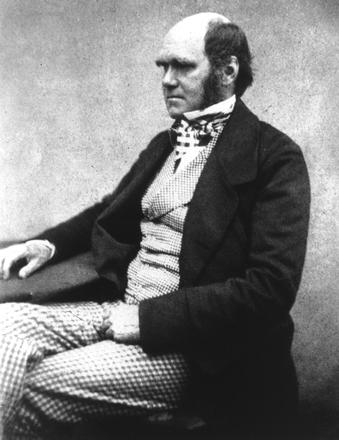The Darwinian Revolution
 Charles Darwin
Charles Darwin
|
I. Before Darwin.
- supernatural design supported by natural history and natural philosophy
- Newton's clock metaphor - God less a Being, more an Architect
- Linnaeus Species Plantarum 1753 - "great chain of being" - a link for each species
- Erasmus Darwin Zoonomia 1796 - speculation on origins and purpose
II. The Revolution.
A. Influences:
- Jean Lamarck Natural History of Animals with Vertebrae 1822
- law of the inheritance of acquired characteristics (e.g., giraffe's neck)
- Thomas Malthus An Essay on the Principle of Population ... 6th ed., 1826
- not progress, but struggle for resources
- Charles Lyell Principles of Geology 1830 ("he completely wrecked the Garden of Eden")
- uniformitarian rather than catastrophist
- Robert Chambers Vestiges of the Natural History of Creation 1844
- fossil record showed sudden changes - "special creations"
- Hermann von Helmholtz On the Conservation of Force 1847
- based on experiments of Carnot, Joule; Kelvin in 1851concluded sun was cooling
- Rudolf Virchow Cellular Pathology 1858
- all cells derive from previous cells, not "spontaneous generation"
- A. R. Wallace paper on evolution 1858 causes Darwin to write book
B. Charles Darwin:
- 1831-36 voyage of HMS Beagle with Capt. Robert FitzRoy
- 1839 Journal of Researches
- 1842-1882 lived at Down House in Kent
- 1845 published Voyage of the Beagle (online text of the book)
- 1859 published The Origin of Species (online text of the book)
- transmutation (evolution in 3rd ed.) of species
- natural selection
- struggle for life
- divergence and coexistence
- 1871 published The Descent of Man, and Selection in Relation to Sex
- first part: sexual selection as well as adaption
- second part: man and animals have common origin - difference in degree, not kind
- 1872 published The Expression of Emotions in Man and Animals
- man not the purpose of creation but part of it
- ntellect and emotions part of nature also
- animals are capable of emotions, reason, learning
- sociability just as important as struggle
III. After Darwin.
A. Sudden Impact:
- Asa Gray, Thomas Huxley lead the defense
- Richard Owen, Bishop Wilberforce lead the attack
- "is it through his grandfather or his grandmother that he claims descent from a monkey?"
- "warfare" metaphor - 1864 Quanta Cura against "errors" - John Draper, Andrew White
B. Rise of the Experimental Sciences:
- at Harvard, Cornell, Johns Hopkins, Chicago
- anthropology
- Edward Tyler, Lewis Henry Morgan, Franz Boas
- paleontology
- O. C. Marsh finds toothed archaeopteryx 1876
- sociology
- Albion Small, Lester Ward
- psychology
- G. Stanley Hall, Lewis Terman
C. Social Darwinism
- Herbert Spencer - analogies
- laissez faire individualism
- William Graham Sumner
- man has no natural rights; opposed reform
D. Marxism
- Karl Marx Das Kapital 1867 - a materialistic history
E. Pragmatism
- William James
- Principles of Psychology 1890 - "stream of consciousness"
- Varieties of Religious Experience 1902 - not theology but feelings
F. Eugenics
- Francis Galton's famous families 1869 - "nature and nurture"
- Europe sapped by repressive church and government
- Richard Dugdale's Jukes and Henry Goddard's Kallikaks
- Charles Davenport 1904
Links:
revised 11/10/01 by Schoenherr | Imperialism

